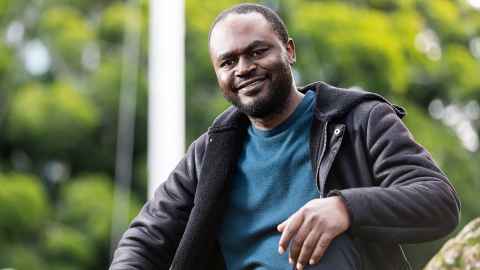Bernard Sama researching the many challenges asylum seekers face
31 October 2022
Cameroon-born PhD student Bernard Sama talks to Judy Wilford about how to treat people claiming refugee status. He knows: he has walked a mile in their shoes.

“You are in a safe place. These are the words a person needs to hear when entering New Zealand to claim asylum,” says University of Auckland PhD student Bernard Sama.
Bernard speaks from personal experience. The chair of the board of the Asylum Seekers Support Trust (ASST) took that step himself more than ten years ago. He succeeded in gaining refugee status under the terms of the United Nations Convention on Refugees, and is now a citizen of New Zealand conducting research that is already changing lives.
“Every person who steps out of a plane as a refugee status claimant is terrified,” he says. “Most are fleeing traumatic events in their countries of origin and are overwhelmed with the fear of being sent back to face further persecution, even the risk of torture or death.”
They need to be referred immediately to someone who understands the UN Convention; instead they are often treated as criminals.
New Zealand is a signatory to the UN Convention, which means the people who claim asylum have a legal right to be admitted, to have their claims examined and be granted permanent residence if those claims are found to be valid. This applies even if they have no valid passport, recognising that those who flee for their lives will often have to do so at short notice and without a chance to gather legal documents.
What will give them peace of mind and a base for a healthy life, says Bernard, is that vital assurance of safety right from the start. There is also an urgent need to improve and streamline refugee status determination processes, which sometimes take years and have a profound effect on the claimants’ lives.
Every person who steps out of a plane as a refugee status claimant is terrif ied.
When Bernard arrived in New Zealand, he already had a law degree from his country of birth, Cameroon. He then studied mental health and psychology, completing a Master of Health Science with first-class honours at AUT before enrolling at the University of Auckland for his PhD with the help of a University of Auckland doctoral scholarship. He is now close to completing his thesis, which explores the psychological impact of laws and examines ways to inform and improve New Zealand’s procedures for determining refugee and protection status.
Bernard says his PhD study was prompted by a commitment to change.
Already it has contributed to one much-needed alteration in policy: the recent decision by the New Zealand government not to detain asylum seekers in criminal justice facilities. This was the thrust of a successful campaign by Amnesty International, which showed the devastating psychological effects of imprisoning people without charge and for unspecified periods, sharing the same space and conditions as remand prisoners.
Bernard’s research contributed to the campaign, and he was a member of the delegation that took the report to parliament. The government then commissioned a report by Victoria Casey KC on The Detention of Asylum Claimants. Her report supported the Amnesty findings, and the decision was made.
There is an urgent need to improve and streamline refugee status determination processes, which sometimes take years and have a
profound effect on the claimants’ lives.
Bernard is researching a range of challenges asylum seekers face. His research comprised part of the data used in a recent Safe Start Fair Future report by the Centre for Asia Pacific Refugee Studies (CAPRS) at the University of Auckland and the ASST.
In May 2022, the report was presented in parliament. It advocates for asylum seekers’ eligibility and government funding for essential services, including accommodation, welfare, mental health services, and the right to work.
It also argues that once the status of Convention refugees is recognised, they should be included in the New Zealand Refugee Resettlement Strategy and enjoy the same conditions as quota refugees.
While quota refugees enter with immediate rights to permanent residence, Convention refugees have to wait, often for two years or more, before their residence status is confirmed.
Says Bernard: “To align those two groups is a logical step towards justice.”
This story is from the University of Auckland's alumni and friends publication Ingenio, Spring 2022 issue.
To republish in part or full, contact ingenio@auckland.ac.nz